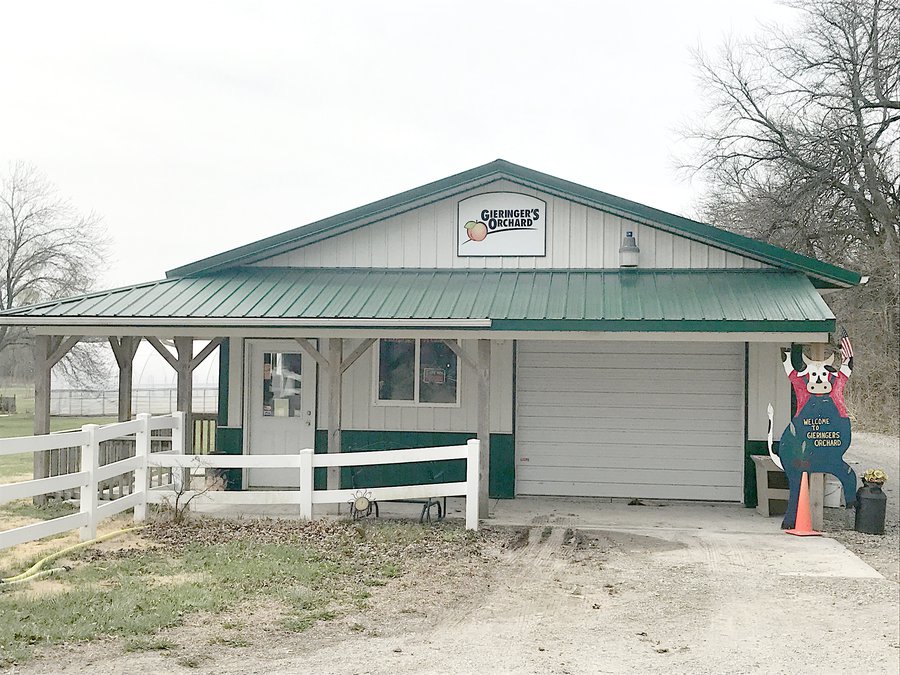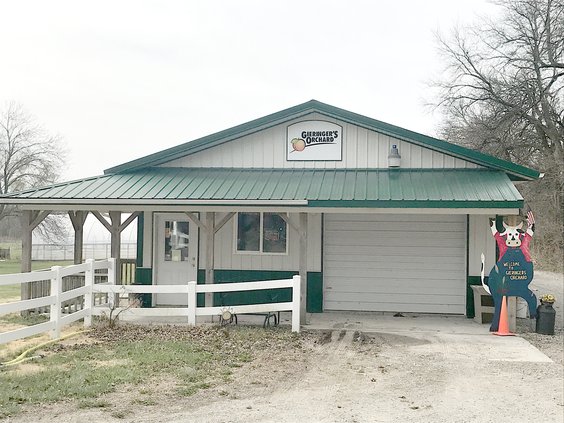Frank Gieringer was raised in Edgerton and started farming outside of town when he graduated from high school. “I started with hogs,” Gieringer says, “but got out of that business in the ’80s, when things went downhill.” Fast forward to today, when he and his wife, Melanie, own 160 acres, own an additional 80 acres with their son, Bryson, and farm more than 1,000 acres. They raised row crops for years, then about 11 years ago, began to diversify.
KRC toured Gieringer’s Orchard and Berry Farm on a cool April day last spring, following a weekend with unusually low temps that reached into the teens. The Gieringer’s peach trees were just blooming — and survived the late frost—and the hoop houses were full of fledgling tomato plants and cauliflower.
The Gieringers started growing in hoop houses a little more than a decade ago. This year, the farm has planted about 400 tomato plants in each of five hoop houses. The sixth hoop house is home to the purple and cheddar cauliflower, a popular add-on buy when people come to pick strawberries.
“We’ve found a design we like from Stuppy Greenhouse in Kansas City. It is a greenhouse frame that has bigger, stronger pipe and drop-curtain sides,” Gieringer says. “We typically get our plastic and other building supplies from FarmTek. I hired someone to make custom ends with wooden frames, which probably cost us $1,500. The ends are more permanent and anyone on the farm could handle closing them if a storm is coming in. We found the zippered ends that come with the FarmTek kits to be too difficult to work with. We’ve had nine years with these custom hoop house ends.”
“We’re probably raising too many tomatoes at this point. We’re going to try to steer away from growing quite so many in future years. We’re no longer moving all the tomatoes off the farm or at the farm, likely because people come out here for fruit, and I don’t want to sell wholesale.” Gieringer says. “Having the tomatoes early brings people to our farmers market stand, but come August, we can’t move much volume because everyone has them.”
The family has a stand at the Overland Park farmers market, where, in addition to tomatoes, they sell vegetables and any fruit excess from the u-pick operation (which isn’t much). The family also uses this time with customers as a marketing tool to invite people to come to the farm for the u-pick experience.
“If you’re wanting people to come to your farm, you have to grow something that puts a little fire in their britches,” Gieringer says. “Peaches, strawberries, things like that. They may buy tomatoes or cauliflower while they are here, but they won’t drive here just to get those items.”
The u-pick and agritainment features have become the biggest focus for growth for the Gieringers. “We built our first building to sell u-pick peaches right by our house, and we are now trying to move to the adjacent 80 acres we bought down the road,” Gieringer says. “That’s where we’re trying to move to agritainment,” Franks says. The farm has a food truck for lemonade and strawberry donuts, a playground space, and offers u-pick strawberries, raspberries, blueberries, blackberries, pumpkins, and, soon, apples. In the fall, the farm adds a haystack maze for the pumpkin-patch visitors.
The family has 9.5 acres of peach trees, home to about 1,000 trees of multiple varieties. In recent years, the family added farm-to-table dinners in the orchard. “We string lights in the trees and set up tables between the rows of peach trees,” Gieringer says.
The family still raises conventional corn and soybeans, and has adapted over the years to a no-till system. “In our row-crop side, we are all no-till. We are able to do that because we grow GMO varieties and we have greatly reduced our pesticide use. We still use an herbicide to do the no-till, but we have seen a major reduction in our spraying.”
Gieringer says the diversification has been worth the work and change of mindset. He says 2017 was the first year the diversified, specialty-crop business beat out the conventional crops in net income. This new focus, and the shared buy-in to the additional acreage, was part of Bryson choosing to come back to the farm and putting real skin in the game.
“It is an incredibly expensive undertaking to expand into what we’re growing into. We’re doing bigger-scale stuff and we’ve borrowed more money, and up until now we’ve grown organically,” Gieringer says.
Take, for example, the newest expansion underway: a high-density, trellised apple orchard. “The orchard technique is largely planted in Honeycrisp on Geneva dwarfing rootstock, planted on 2-foot centers,” Gieringer explains. “The goal is to get a fruiting wall by tying the tree up a trellis, and once it reaches 10 feet, let it fruit and fill the space.” This keeps the trees narrow, meaning the aisles in between are open and the trees are more easily pickable, right at eye height. “Most orchards will be going to this, but it is incredibly expensive,” Gieringer says.
Or consider the plasticulture strawberry operation. The family has about 56,000 plants, replanted and rotated annually, on black plastic in rows with wide, mowed paths in between, covering about 5 acres. “We’ve got about 25 acres of deer fence, which was put up in late summer 2017. We needed it up for the strawberries, and we were tired of moving temporary fence every year we rotated our strawberries. Decided to bite the bullet and do it right,” Gieringer says.
He estimates with the deer fence, labor, plugs, irrigation, black plastic, covers, fungicide, fertilizer and harvest boxes, a farmer will invest about $10,000 an acre the first year. “But, if you follow the Plasticulture Strawberries handbook out of Ohio State and do it exactly by the book — without skipping steps and each step on time — you will be successful.” Gieringer estimates you should get 1 pound of berries per plant on average. At about $3.50 per pound, you can start to estimate a payback period on the investment.
Their farm is largely supported by the large, nearby population center of Kansas City. On the highest-volume day last year, Gieringer estimates 2,200 people came out for u-pick strawberries. Subsequent years are much less investment-intensive, however, labor costs will continue to be an issue. In truth, labor costs are one of the Gieringer’s most limiting factors.
“In January, we sent out 52 W2s, most of whom are high school temps. We have four full-time people right now,” Gieringer says, “and just hired our first ‘inside’ help to handle accounting, FSMA, etc.” On one strawberry weekend this year, he says his wife sent out $1,200 in paychecks.
Another concern, as shared by other specialty-crop growers, are the regulations and FSMA. But, Gieringer says, “Anybody who’s going to do this full-time and is going to be serious needs to be FSMA compliant, because even people who are exempt will be held accountable if they have an incident. It’s going to kick out a lot of the older producers who won’t go through the process, but it will present more opportunity for somebody who is willing to go through the steps and bear the expense.”
The family is no stranger to adapting to change when necessary. For example, they modified their parking when the operation took off and began to think more about customer flow. “We had consultants come in and help us design our operation so we could handle thousands of people at a time,” Gieringer says.
With their continued growth, innovation and prime location, thousands of customers each weekend from strawberry season to the end of apple season isn’t much of a stretch of the imagination.
Jennifer Kongs is a freelance writer with Bark Media in Lawrence, KS. who produced this story as part of KRC’s Specialty Crop Block Grant funded by the Kansas Department of Agriculture through USDA’s SCBG Program.







